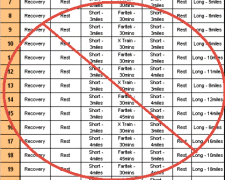Schedules Schmedules - Set Running Goals and Targets and You'll Be Just Fine!
/First off, my mileage last week was 43, including a 10.5 mile long run. I've got a 10K coming up at the Westlake Village Love Run this Saturday so I'll plan NOT to run a long run on Saturday. Perhaps I'll wake up earlier than normal on Wednesday morning and try for a longer run mid-week.

I have work schedules, kid drop off and pick up schedules, errand schedules, medical appointment schedules, household chore schedules, schedules to remember to call my parents, tax appointments, lunch schedules, staff meeting schedules, you name it. I've got enough schedules. I'm not alone.
Schedules are good as they help me stay organized. But you know what, I'm NOT gonna force myself into a strict running schedule as schedules tend to take the enjoyment out of things. So instead of precise schedules that you can find plenty of at Runners World, Active.com, Running Times and other websites, I prefer to have certain key goals and target in training for a marathon:
- Gradually ramp up weekly mileage...don't do something drastic (for most people this means increasing mileage more than 10% each week...but I don't measure it that precisely). Aim for peak mileage 4 to 6 weeks prior to the marathon.
- Gradually increase the length of the long run. Generally I target 2 to 3 20-milers, but I don't sweat it if I only reach 16 to 18 and if I feel I can I'll do more than 20.
- Build slack time into the schedule. Take rest days. Plan for bad days and bad weeks. Plan for soreness, illness, injuries and tiredness. But...go for it when you feel good...run more, train harder (psychologically it feels good to "bank" miles for the bad days).
- Place races of varying distances into your schedule...5K, 10K, 10 miler, half marathon, etc. Take races seriously only if that is in your DNA, Type A-ers. Shorter distance races are fun, social events and great practice for your marathon. Not to mention they can provide you a good feel for what your marathon target can be (more in a future post).
- Don't feel compelled to do track workouts when training for a marathon, unless you are aiming for a sub 3 hour performance and feel you really need it (and if so, limit your intervals to 800 meters to mile repeats). My experience is that while speedwork is awesome, it beats up marathoners pretty hard as they need to recover from weekend long runs, not run circles around a track.
- Taper off the mileage over the last 3 to 4 weeks prior to the marathon. Week 3 should be up to 75% of peak mileage. Week 2 50%. Week 1 25%. Last few days should be minimal mileage. Don't go walking around Disneyland the day before the race. Gotta rest.
The key point of this post is, keep running fun. If you feel that a training schedule will keep you motivated and on track, then great, use one. But if you are like me and feel constrained by one, do yourself a favor and remove it from your mental agenda.




